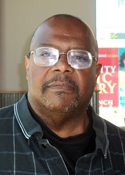You have /5 articles left.
Sign up for a free account or log in.

Donald Matthews
Naropa University
It’s not uncommon for students at Naropa University, a Buddhist institution, to take vows of silence, even during class. So is it grounds for suspension for a professor to do so? A religious studies professor says that administrators are using his in-class silence as one reason to punish him for speaking out against an alleged lack of commitment to diversity on that campus.
But administrators say Donald Matthews has been the subject of many student complaints about inappropriate behavior and his vow of silence two weeks before the end of the semester was a kind of last straw.
Matthews, a full-time professor (Naropa doesn’t have a tenure system) in his third year at Naropa, received an email this month letting him know he was being put on paid leave for his “actions” on campus. He says he was given no other information, but eventually learned that administrators were responding to student complaints that he led two course periods the day prior in silence, to protest what he sees as a lack of commitment to diversity.
The professor says his students sometimes pass him a note at the beginning of class to let him know they’re taking a vow of silence, so he believed it was acceptable for him to do so. Matthews notified his students in a written message what he was doing and why, gave them an assignment to work on, and did talk for the last 10-15 minutes of class to answer questions, he said. When a student asked him how many days his vow would last, he said he didn't know.
“I summed it up and answered questions, so it wasn’t a completely silent protest,” he said. “I wasn’t going to deprive students of an educational experience. …[Administrators] were targeting me because I was the only one going to stand up to them about issues of diversity.”
It’s true that Matthews has been a vocal advocate for more support for minority students, faculty and administrators on campus. He talks about it frequently, and spoke on that topic at a September meeting of Naropa’s Board of Trustees. He wants scholarships for minority students, a stronger service and support network for them, and more minority scholars in leadership positions at the university, he said.
But administrators say it’s not just Matthews’s silence, and definitely not his activism, that led to his suspension. President Charles Lief said the professor had racked up more than 30 student complaints in 18 months, many of which involve Matthews allegedly saying students needed therapy or other forms of psychological help. Lief says Matthews was offered extensive mentorship about how not “psychoanalyze in the classroom,” and that his claims that he’s been awarded no due process in the past just aren't true.
But Matthews says he was stunned to find out that complaints had been logged so far back, and that administrators never told him there was a mounting problem.
Lief says that administrators also had decided to remove him from the classroom after students reported that he had used social media and emails to threaten to sue them for defamation. Matthews says he never threatened students, and never said a student needed therapy – one of the only allegations known to him before his suspension.
Matthews said he was asked to visit campus Thursday to meet with administrators about suggestions for adjusting his behavior around students. But he did not attend, as he wanted legal representation there and could not arrange it in time. He wants to keep working at Naropa, he says, as he enjoys his work and his students. But he wants an opportunity to defend himself before peers prior to his return.
Lief says he does want Matthews to return to campus, but that the professor needs more counseling on how to interact with students.
“We want him to stay,” he said. He added that the university was working to address concerns about on-campus diversity, including that it’s hiring a new chief diversity officer.
According to policies and procedures recommended by the American Association of University Professors, faculty members should not be removed from the classroom until they’ve been given an opportunity to appeal to a group of elected faculty members – unless they’re an immediate threat to students.
One of Matthews’s students, Jamil Scott, a graduate student of divinity, said the professor's departure puts him in a bind, given that he’s relying heavily on Matthews for thesis guidance. Scott said Matthews, who comes from a Christian background and uses the Socratic method, is generally less “calm and contemplative” than other professors at the Buddhist university. As a result, Scott said, he may be misunderstood by some of his students.
Scott, a members of Naropa’s Community of Color, agreed with Matthews that there is subtle evidence of "institutionalized racism" on campus. But it’s hard to tell how much emanates from Naropa itself and how much from Boulder, an overwhelmingly white town, he said.









